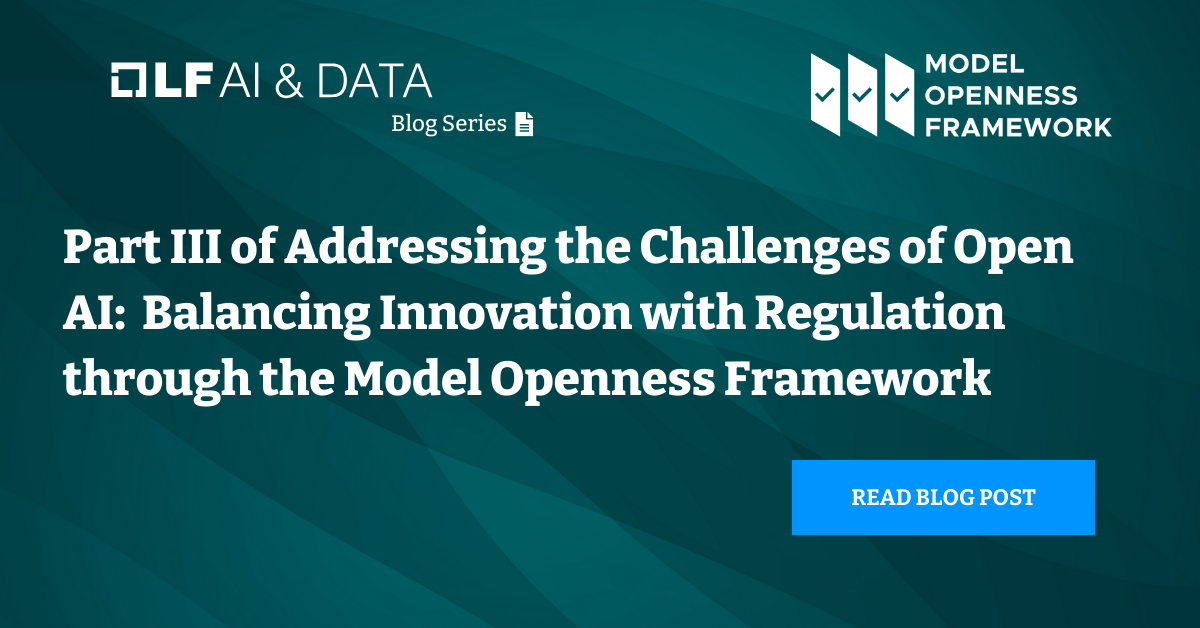
Balancing open innovation with responsible governance is challenging and essential in the fast-paced field of artificial intelligence. LF AI & Data’s Model Openness Framework (MOF) addresses this challenge head-on by defining and harmonizing the intricate restrictions and policies governing ethical AI deployment and scalability. By setting explicit guidelines for openness and ethical practices, the MOF plays a vital role in steering the responsible development of AI technologies.
Understanding the Challenge of Diverse Restrictions
AI technologies, especially those developed under open AI principles, encounter a wide range of restrictions that vary significantly across regions and industries. These include:
- Regulatory Compliance: Different countries have varying regulations concerning data privacy (like GDPR in Europe), AI ethics, and usage that can impact how AI technologies are developed and deployed.
- Ethical Considerations: Issues such as bias in AI, transparency of AI operations, and the potential impacts on job markets must be considered to ensure ethical deployment.
- Acceptable Use Policies (AUPs): AUPs define the permissible and prohibited uses of AI technologies. They are crucial in preventing misuse of AI but must be balanced with the need to keep AI open and accessible.
While these restrictions are crucial for maintaining ethical standards and compliance, they can inadvertently hinder innovation and the dissemination of AI technologies if not managed properly. This is where the MOF comes in.
The Role of the Model Openness Framework (MOF) in Addressing Restrictions
The MOF tackles these diverse restrictions by incorporating them into its evaluation and classification system, ensuring that AI technologies not only adhere to open AI principles but also respect and incorporate necessary regulatory and ethical boundaries.
- Standardizing Acceptable Use: MOF provides a framework for integrating AUPs into the development and deployment of AI models. By standardizing how AUPs are applied, MOF ensures that these policies are not only clear and comprehensive but also harmonized across different projects to prevent inconsistencies that could hinder collaboration or lead to ethical breaches.
- Facilitating Regulatory Compliance: Through its open science and open data principles, MOF encourages the transparency needed for regulatory compliance. By making data and methodologies open, it becomes easier to demonstrate compliance with various regional regulations, thereby facilitating wider adoption and integration of AI technologies across borders.
- Promoting Ethical AI Development: MOF emphasizes ethical considerations as a core component of its classification system. This includes ensuring that AI models are free from biases and that the datasets used are representative and fair. By rating models based on these criteria, MOF pushes developers to prioritize these aspects, thus promoting more ethical AI solutions.
- Encouraging Responsible Innovation: By aligning with open access principles, MOF ensures that while AI technologies remain open and accessible, they are also deployed responsibly. This balance encourages innovation but within a framework that respects ethical and legal boundaries.
Introducing the Model Openness Tool (MoT)
To further support the application of the Model Openness Framework, we’ve developed the Model Openness Tool (MoT). This tool implements MoF by evaluating each criterion from the framework and generating a score based on how well each item is met. The MoT provides a practical, user-friendly way to apply the MOF framework to your model and produce a clear, self-service score.
We encourage all model creators to register their models in the MoT and obtain their openness badge. By doing so, you contribute to a more transparent and ethical AI community. Register your model today and take a step towards responsible AI development!
Conclusion
As AI technologies evolve, the Model Openness Framework (MOF) plays a vital role in addressing the legal, ethical, and regulatory challenges we face today. By integrating diverse restrictions and Acceptable Use Policies, MOF ensures that open AI remains innovative and ethically governed.
Join LF AI & Data in leading the charge to set new standards for managing openness and restrictions, ensuring that AI benefits society while mitigating risks. Get involved with MOF today to help shape the future of responsible AI development.
- Explore the Model Openness Tool here
- Explore the full Model Openness Framework here
- Join the Generative AI Commons community and mailing list here
- Advocate for the use of MOF in your organization and network
The next blog will discuss the common misunderstandings regarding license implications for AI models.
LF AI & Data Resources
- Learn about membership opportunities
- Explore the interactive landscape
- Check out our technical projects
- Join us at upcoming events
- Read the latest announcements on the blog
- Subscribe to the mailing lists
- Follow us on Twitter or LinkedIn

